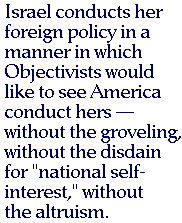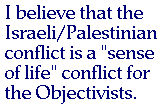Mr. Neff replies
Dr. Sniegoski has detailed a fault of the official Objectivist sites in so
many ways that it is a pity his work is relegated to the LTE corner of
TLD.
He and I disagree on two primary points:
(a) That Sharonist Zionism is central to the work of the two
primary Objectivist sites; and
(b) that the primary Objectivist sites are Sharonist Zionist
because their principals are Jews.
On the first point, I concede that the two primary Objectivist sites
contain much that might lead to Dr. Sniegoski's contention, and it may be
simply that he and I mean different things by "central." But let's not let
this exchange be merely semantic.
I contend that while Zionism is important to the work of each of the sites,
it is not central to that work. In this connection, for a reason to be given
later, I shall be speaking only of ARI's site, aynrand.org. As I
argued before, there is quite a lot of material on that site that has nothing
to do with foreign policy, and since neither Dr. Sniegoski nor I have access
to a list of all the text files on it, it is difficult to make the case for
either side by counting.
There is, I think, another possible measure. On the Internet there is an
extraordinary site — archive.org — where one can take a look at
superseded Web pages. (The Ditch cannot be so viewed because it has been
at its current address for less than a year, and archive.org seems to be
about a year behind in posting the contents of its archives.) If one puts in
the URL www.aynrand.org, the list that comes up gives the date of August
1, 2001, as the last archive for that site before the atrocities of
September 11. (The site that actually comes up gives an earlier date as its
last update.)
On the site as it existed before those atrocities, there is no "microsite"
for Israel at all. There are six topics for aynrand.org's "media link"
section. On the site as it exists today, there are those six and two more, a
radio show and the "Moral Defense of Israel." On the old site, there are
three "moral defense" projects: opposing Clinton's and Colin Powell's
"volunteerism" campaigns; defending Microsoft; and defending Elia Kazan.
Today, the "moral defense" of Israel is clearly dominant.
On the archived site, I found only six articles dealing with terrorism and
Palestine, even though the current hostilities date from Ariel Sharon's
visit to the Temple Mount almost a year before September 11. (On the
current site, four essays come up if one uses the search term "Temple
Mount," all of them dated 2002.)
An organization that has been around as long as ARI has been surely would
have made its central work clear before now. On the basis of discussions
of Palestine and terrorism as they existed before September 11, no one
would ever have thought that the well-being of Israel was central to ARI
at all. It is entirely possible that ARI could lose its focus and make the
welfare of Israel its central work, but I think I have shown that the
welfare of Israel is not central to ARI as such.
What about The Objectivist Center? I have a challenge. I have not looked at
the archived site (which is shown at http://web.archive.org/web/20010711222601/http://ios.
or g/ — last year, the organization was known as the Institute
for Objectivist Studies). I am confident that similar results would be
obtained from an examination of it; if someone should learn that they are
not, I will reluctantly concede that Dr. Sniegoski's case is much stronger
than it appears to me now. I trust Strakon will reopen the debate just
enough for the egg to be applied to my face.
***
Now for the second point: the explanation for the Sharonist Zionism in the
two primary Objectivist organizations.
Dr. Sniegoski argues, "As compared to the general population, Jews
certainly tend to be more supportive of Israel. Why would Objectivist
Jews be any different? The fact that some Gentiles support Israel while
some Jews do not does not undermine the idea that Jews, by and large, are
far stronger supporters of Israel than Gentiles."
He is right that the fact that some Gentiles support Israel does not
undermine the idea that Jews are stronger supporters than Gentiles.
Moreover, there is nothing inconsistent in holding that the reasons for
Jews' support are different from the reasons for Gentiles' support. And a
strong case could be made that the reasons for the one are no different
from what they are for other groups of Jews, and that the reasons for the
other are also no different from what they are for other groups of
Gentiles. I go further: I think the empirical evidence for such an answer is
probably very strong.
Certainly as each organization takes a more and more strident position,
each will attract more Jewish support and money. I would not be surprised
to see that there are few Arabs who support the two organizations.
(Similarly, neither organization has ever enjoyed substantial black or
Hispanic support. Like libertarianism, Objectivism has never been
particularly attractive to any groups other than Jews and white
Gentiles.)
 Nevertheless, I think that that
conclusion would be false. I suggest that there is another reason for the
support of the sites for Israel and that that reason applies equally to
Jews and Gentiles. It is related to those aspects of Objectivism that make
it different from other philosophies. My conclusion, however, is based only
my "sense" of how Objectivists see themselves, of what they take to be
important in the world, and of how they approach matters.
Nevertheless, I think that that
conclusion would be false. I suggest that there is another reason for the
support of the sites for Israel and that that reason applies equally to
Jews and Gentiles. It is related to those aspects of Objectivism that make
it different from other philosophies. My conclusion, however, is based only
my "sense" of how Objectivists see themselves, of what they take to be
important in the world, and of how they approach matters.
A hint of the explanation I shall offer is seen in Ayn Rand's contention
concerning the Israeli-Palestinian dispute: that when one sees a civilized
man in a conflict with a savage, one must side with the civilized man.
That is virtually the only argument she ever gave publicly for her support
of Israel. Please note: it lacks any sense of the area's or peoples' history
(even propaganda-history); it suggests no appreciation for the subtleties
of foreign-policy; and it does not even draw on her own philosophical
principles.
I suggest that the matter is more of a "sense-of-life" issue for the
Randians than it is anything else. Israel conducts her foreign policy in a
manner in which Objectivists would like to see America conduct hers
— without the groveling, without the disdain for "national
self-interest," without the altruism. Israel is a little country facing the
enmity of a dozen or more other countries, all larger than herself. Israel
has made the desert bloom, while her enemies remain trapped in medieval
(if not prehistoric) living conditions with a medieval religion, despite
their immeasurable wealth — wealth that they could not tap,
produce, or develop themselves. They could only nationalize it after the
capitalist countries of the world had done the work for them. Still, this
brave little country takes no crap from anyone. She defies the world and
does what is right in her own eyes. She even dares to antagonize her
primary benefactor when that benefactor begins to waver and lose her own
moral vision. And when Israel goes to war, she whups her enemies.
That, at least, is a common view of Israel, and it is just the sort of view
that would appeal to anyone who loves a novel in which the high point is
an architect's blowing up a housing project he designed because
"second-handers," in the course of building it, betrayed his design. It is the sort of
view that would appeal to anyone who loves a novel in which a main
character blows up the incalculable wealth of copper mines that his
family have been building each generation for 400 years, leaving behind
the message, "Brothers, you asked for it."
The real parallel hero here, though, is not Howard Roark or Francisco
D'Anconia or even Hank Rearden. It's Bjorn Faulkner of The Night of
January 16 (AKA Penthouse Legend). Faulkner, for whose murder
his mistress is on trial, is clearly dishonest, a rapist, a forger, a
power-seeker on a grand scale, and a swindler. His mistress loves him not in
spite of what he was but because of what he was. The jury was to
be drawn from each evening's audience, and Rand wrote the play with a
different ending for each verdict. And their verdict would be made on the
basis of each juror's sense of life, a "pre-conceptual equivalent of
metaphysics," his "emotional, subconsciously integrated appraisal of man
and of existence."
The kind of people who find Bjorn Faulkner and his mistress Karen Andre
heroic will also find Israel heroic. The error comes in forgetting that
Faulkner and Andre are symbols. Israel — at least that adolescent
Israel I described above — would be a symbol for what a heroic,
self-confident country can and should be. But no Objectivist would ever
think that stock swindling was virtuous, so on a biographical or empirical
level no Objectivist would ever find Faulkner heroic. It is only the
symbolic Faulkner who can be heroic. If, however, you forget that Israel is
a real country, with a real history, and if you never study that history, it
is possible to end up confusing symbolism with foreign policy.
I do not think this is an isolated error among Objectivists. To take one
other example, Rand's delight and praise of the Apollo 11 mission was in
contradiction to what she had written about government projects in her
essay "The Monument Builders." But on the basis of her sense of life, her
love for genius and for achievement, she praised it. So treating the symbol
as reality is not an error the principal Objectivists make only when
writing about Israel. But it is an error they seem always to have made
with respect to Israel. This is in the nature of things a difficult
proposition to prove, and I will not attempt it here. I am merely
presenting it, along with a few reasons for believing it. I recommend that
anyone interested in the possibility get a copy of the play and read it
— it is quite short — and see whether my suggestion carries
the "ring of truth."
I offer one final consideration to suggest that Objectivists, even the Jews
among them, are not driven to and by their Zionism in quite the way that
most Zionists are: I doubt — and again I am prepared to have egg
smeared on my face — that anyone will find on the ARI Website or on
the TOC Website any rejection of a position contrary to their own as
"anti-Semitic." I think no one will find them trying to destroy the careers
of critics of Israel. That is just not the Randian style, and I will be
amazed if I am shown wrong. It is, however, commonplace among other
supporters of Israel, and the difference hints at a more profound
difference lying at the root of their Zionism.
I go further. I suspect that if there is any "anti" tossed around at all, it
will be "anti-mind," "anti-reason," "anti-life," "anti-productive." And
maybe even "anti-American."
Reply posted August
30, 2002
Dr. Sniegoski
replies
Mr. Neff makes some excellent points. I would especially like to comment
on his perceptive observation that Objectivists portray Israel as the
embodiment of the Objectivist ethics — upholding "selfishness,"
productive success, and Western civilization in contrast to the Arabs'
whining, incompetence, and savagery. It is remarkable how radically the
official view of liberals in the United States differs from that of the
Objectivists, as envisioned by Mr. Neff. For liberals, the Israeli Jews hold
ultimate victim status, having suffered the greatest evil of all time, the
HOLOCAUST. No matter now wealthy, Israeli Jews are portrayed as
being powerless and faced eternally with another HOLOCAUST at the
hands of powerful aggressors. As ultimate victims, Jews must always be
defended.
It does make me wonder. Do Objectivist (and liberal) supporters of Israel
really identify with Israel because she embodies their own respective
values? Or do they identify with Israel first and then project onto her
their own Objectivist (or liberal) values? Given the fact that the
Objectivist and mainstream liberal views of Israel differ so radically, it
is my belief that the second situation prevails. Furthermore, if Israel
really embodies the ethics of Objectivism, why does she need or deserve
U.S. government support any more than a Randian hero would need or
deserve a government subsidy?
I think the question continues to call for further analysis.
August 30, 2002; posted September 6, 2002
Mr. Neff replies
I think that Dr. Sniegoski has missed my main point.
I did not say that Objectivists portray Israel as anything, and
certainly not as an embodiment of the Objectivist ethics. Indeed,
the point of the parallel with the hero-crook Bjorn Faulkner was that the
matter does not hang on ethical questions at all, but on a "sense of
life."
While the difference between the Objectivist treatment of Israel and the
liberal one is striking, it is by no means unusual. Often, when Rand was
discussing some current issue she would say that such-and-such a side
was right, "but not in the way they mean." The classic example was her
opposition to the war in Vietnam. She was probably the only critic to hold
both that it was a stupid war and that the United States should win it.
Moreover, it is worth remembering that the Objectivist position on Israel
was first formulated in the early years of Israel's history, and it was
stated publicly only after the Six-Day War. It is hard to remember, but in
those days the Holocaust simply was not a central theme of Jewish
writers or supporters of Israel. There was not even a specific word for
the crimes of the Third Reich against the Jews. Their status as the
ultimate victims had not yet emerged. (Watch the movie "Exodus"; the
suffering of Jews in that movie is usually discussed as something that
they overcame, and their eventual victory proves their special status in
the world.) In those days, I suspect even liberals did not think of Israel in
victim terms.
Dr. Sniegoski raises an interesting question when he asks whether a
Randian hero would need or deserve a government subsidy. Rand was
opposed to government subsidies, and I assume that all Objectivists (even
those not associated with the major centers) would reject them. While her
heroes are uniformly self-sustaining, standing in no need of the approval
or appreciation of others, she regarded it as a gross injustice when such
real-life heroes were denied approval or appreciation. It was more a
question of "emotional fuel"; it falls into the category neither of need nor
desire, but is rather a kind of nourishment. A real-life Objectivist hero
would deserve help, but only because he didn't need it.
Now ... would the official Objectivists support the discontinuing of foreign
aid to Israel? One would assume they would (but not for the reasons
pro-Palestinians might give). I went to the TOC Website, which has a page on
which one may post questions about Objectivism. I asked them, "I know
TOC is favorably disposed toward Israel, but not in favor of foreign aid.
Would TOC be willing to see all aid to Israel ended?"
The answer I received is worth including in this discussion.
TOC's answer
Thanks for getting in touch with us. You commented on foreign aid:
Comment — I know TOC is favorably disposed toward Israel, but not
in favor of foreign aid. Would TOC be willing to see all aid to Israel
ended?
Reply:
TOC does not have a position on foreign aid to Israel as such. In general,
Objectivism holds that government has a single purpose: to protect its
citizens' rights to freedom from the initiation of force. As military
defense is one legitimate component of government, it is conceivable that
there might be a defense rationale for aiding an ally. I don't really see how
supporting Israel helps a current U.S. strategic military interest, but
perhaps a case could be made on those grounds. Israel is a military ally of
ours, and is a democracy. But most foreign aid projects simply are not
within the proper province of government.
Of course, Objectivism is not opposed to foreign aid: any individuals who
want to aid foreigners should be free to do so, as long as they do not
finance wartime enemies of their own country. So TOC would not favor
ending all aid to Israel. But it might suggest ending most of the
tax-financed aid that currently goes there, or to any country or person.
Best wishes. I hope you are or become a TOC member, and help us fight for
a more rational and freer culture.
— William Thomas
Manager of Research and Training
The Objectivist Center
http://www.objectivistcenter.org
email:
wthomas@objectivistcenter.org
Tel: Mon/Wed (845)
471-6100
***
It is conceivable that Mr. Thomas is speaking only for himself. But I'm
inclined to think he is not.
In any case, I can think of little to say about this answer. It has been a
long time since I have talked to any constitutionalist as pro-government
as the official Objectivists are, and I had forgotten just how much in the
way of a tax-supported undertaking they could stomach.
"Radicals for capitalism," my eye.
Reply posted September 6, 2002
Editor's note. I now close this correspondence
between Mr. Neff and Dr. Sniegoski. I continue to invite TLD readers to
comment on their exchange as well as on Mr. Neff's original column. Nicholas Strakon
Editor-in-chief
September 6,
2002
© 2002 by WTM Enterprises. All rights
reserved.
To Mr. Neff's column
Other reader response
to Mr. Neff's
column.
If you found this article to be interesting, please donate to our cause. You should make your check or m.o. payable in U.S. dollars to WTM
Enterprises and send it to:
WTM Enterprises
P.O. Box 224
Roanoke, IN 46783
Thanks for helping to assure a future for TLD!
Notice to visitors who came
straight to this document from off site: You are deep in The Last Ditch. You
should check out our home page and table
of contents.
 and that the United States should unequivocally support
Israel." That's right, unequivocally. To show that Israel's moral
purity warrants U.S. support, the publication continues: "Israel and those
who attack it are not moral equals. Israel is a free, Westernized country,
which recognizes the individual rights of its citizens (such as their right
to property and freedom of speech). It uses military force only in
self-defense, in order to protect itself." [Ibid.]
and that the United States should unequivocally support
Israel." That's right, unequivocally. To show that Israel's moral
purity warrants U.S. support, the publication continues: "Israel and those
who attack it are not moral equals. Israel is a free, Westernized country,
which recognizes the individual rights of its citizens (such as their right
to property and freedom of speech). It uses military force only in
self-defense, in order to protect itself." [Ibid.] One ARI article maintains that the
exchange of any land on the Israeli-occupied West Bank would lead to
Israel's suicide.
One ARI article maintains that the
exchange of any land on the Israeli-occupied West Bank would lead to
Israel's suicide.  Because in ARI's view the
Palestinians do not enjoy the right to self-determination, their resistance
to Israeli occupation amounts to "aggression" categorically, quite
independently of whether any Palestinians ever engage in aggression
against Israeli noncombatants. But that's the least of it: ARI wants the
United States to apply the same philosophy right across the Middle East,
recognizing that it "requires mass civilian deaths in terrorist countries."
ARI seems to be saying that the protection of Israel necessitates and
justifies the extermination of the non-Jewish peoples of the Middle
East.
Because in ARI's view the
Palestinians do not enjoy the right to self-determination, their resistance
to Israeli occupation amounts to "aggression" categorically, quite
independently of whether any Palestinians ever engage in aggression
against Israeli noncombatants. But that's the least of it: ARI wants the
United States to apply the same philosophy right across the Middle East,
recognizing that it "requires mass civilian deaths in terrorist countries."
ARI seems to be saying that the protection of Israel necessitates and
justifies the extermination of the non-Jewish peoples of the Middle
East. As I have stipulated, I am no expert
on Objectivism, but I am not so sure how far the "Randroid" argument
takes us in this case. While Rand was pro-Israel, it is not apparent that
she advocated an American military defense of Israel, much less anything
like the offensive moves that the ARI expounds. In fact, Rand tended to
oppose American military intervention. As the noted libertarian scholar
Roy Childs writes: "She spoke often rather fondly about 'isolationism,' and
seemed to have been sympathetic with the America First Committee."
Childs continues: "For years, I have tried to find a coherent foreign policy
in her works, and have always failed."
As I have stipulated, I am no expert
on Objectivism, but I am not so sure how far the "Randroid" argument
takes us in this case. While Rand was pro-Israel, it is not apparent that
she advocated an American military defense of Israel, much less anything
like the offensive moves that the ARI expounds. In fact, Rand tended to
oppose American military intervention. As the noted libertarian scholar
Roy Childs writes: "She spoke often rather fondly about 'isolationism,' and
seemed to have been sympathetic with the America First Committee."
Childs continues: "For years, I have tried to find a coherent foreign policy
in her works, and have always failed."  My own speculation is that atheism
has become more central to Objectivism's "sense of life" than big-name
Objectivists will admit — more central than individualism. Israel is
secular enough for them, and the Palestinians are "mystical" enough for
them, that they can draw distinctions and take sides. Just as Rand's play
Penthouse Legend (AKA The Night of January 16th) was a
"sense of life" drama, I believe that the Israel/Palestinian conflict is a
"sense of life" conflict for them, and they have allowed the sense-of-life
aspects of foreign policy to overrule the more linear-principle
aspects.
My own speculation is that atheism
has become more central to Objectivism's "sense of life" than big-name
Objectivists will admit — more central than individualism. Israel is
secular enough for them, and the Palestinians are "mystical" enough for
them, that they can draw distinctions and take sides. Just as Rand's play
Penthouse Legend (AKA The Night of January 16th) was a
"sense of life" drama, I believe that the Israel/Palestinian conflict is a
"sense of life" conflict for them, and they have allowed the sense-of-life
aspects of foreign policy to overrule the more linear-principle
aspects. identifying with the Jewish
celebration of Yom Kippur and Rosh Hashanah, I couldn't help but conclude
that Jews and Judeophilia loom large in organized Objectivism.
identifying with the Jewish
celebration of Yom Kippur and Rosh Hashanah, I couldn't help but conclude
that Jews and Judeophilia loom large in organized Objectivism.  Nevertheless, I think that that
conclusion would be false. I suggest that there is another reason for the
support of the sites for Israel and that that reason applies equally to
Jews and Gentiles. It is related to those aspects of Objectivism that make
it different from other philosophies. My conclusion, however, is based only
my "sense" of how Objectivists see themselves, of what they take to be
important in the world, and of how they approach matters.
Nevertheless, I think that that
conclusion would be false. I suggest that there is another reason for the
support of the sites for Israel and that that reason applies equally to
Jews and Gentiles. It is related to those aspects of Objectivism that make
it different from other philosophies. My conclusion, however, is based only
my "sense" of how Objectivists see themselves, of what they take to be
important in the world, and of how they approach matters.